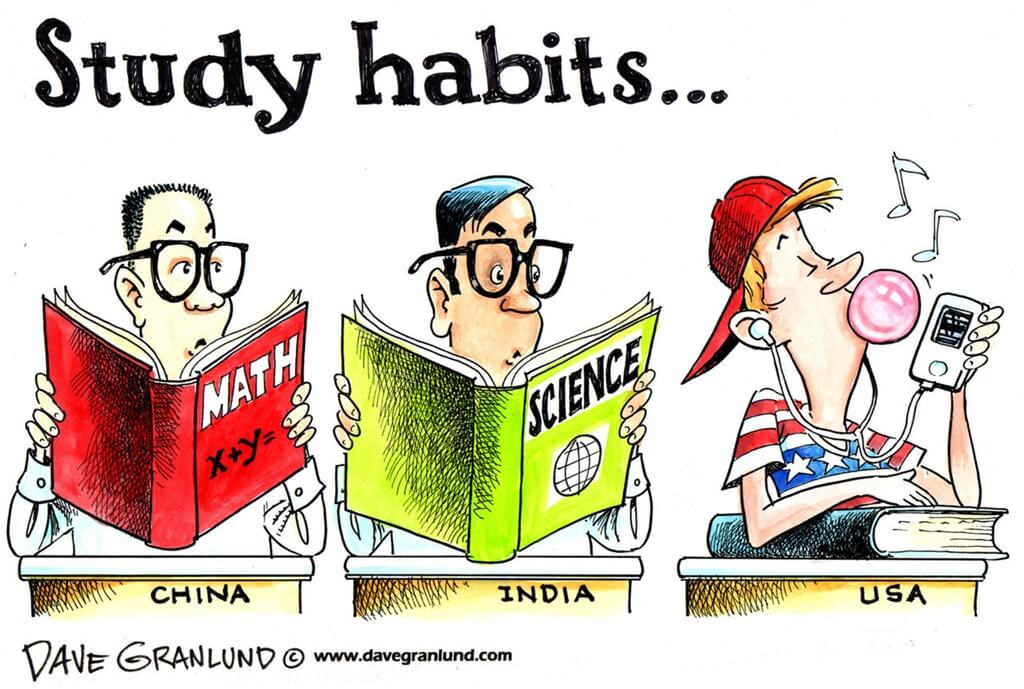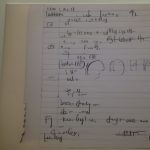21 Study Habits From The Reddit Community

1. “Find something to motivate you, I used to try and coast through tests and class work, relying on the bare minimum to get you through. used. When I found out what I really wanted to do when I was older that really helped me, I always wanted to go into law and when I realised I wanted to be a lawyer, that really pushed me forward. For me all those talks from parents about revising and to always do work didn’t work for me.”
2. “I always found my self making study guides, especially for the teachers that don’t hand them out. Rewriting the information for each unit and analyzing it a couple of days before big tests helps a lot. It makes that binder full of notes seem like only a few pages of review. … In addition, I found many other students asking for the study guides I make because they are in a students POV. Thus I became known as ‘the grade-saver.’ Hope it helps.”
3. “When you are learning something, learn why it is the way it is, not just the facts. If you really understand how something works, school stops becoming memorization of facts for tests and actually gives you meaningful information. That way you can figure out questions you normally might not know the answer to.”
4. “Even if you pick a major you love you’ll inevitably have to take a bunch of classes you don’t like. Being “smart” in and of itself doesn’t get you at the top. The key is discipline. Which at its most basic level means you simply do what you’re supposed to do. If you have an exam, study for it. If you have a paper, turn it in when it’s due. There’s plenty of people who don’t do that. Also don’t blame your professors an an excuse, because you will inevitably have a few s****y professors. You need to learn how to pick up a book, supplement, or whatever it is you need to do in order to teach yourself.
“Also your number one goal is to graduate. I know plenty of guys that were distracted by women and dropped out for it. They put sex and relationships before graduating. Many young kids do this, after all were biologically designed to want to reproduce. Don’t let your biological instincts take over and put that first. It’s okay to have relationships as long as you remember your number one goal is to graduate and can handle it.
“Also try not to stress over grades too much if you’re passing classes and doing your best!”
5. “Start assignments early. In university I usually tend to start large assignments a few weeks before the due date, and spread out the work so I don’t feel as stressed and overwhelmed. Never leave things to the last minute. Start the work early so you can finish early and relax while others are panicking.”
6. “Associate yourself with people doing academically better than you. It makes you want to strive to be BETTER than them.”
7. “Not anywhere close to top of my class. But one thing that helped me as an English major was to write the first page of an essay assignment within minutes of getting it. Starting is the hardest part. Made finishing it later so much easier.”
8. “STEM guys should not spend time trying to become good at sports and be an all-rounder etc, that doesn’t really help later in life if you’re interested in your STEM field. If all you want to do is become a manager of some kind, then all that extra-curricular stuff is lovely.
“Programmers – contribute to opensource coding projects.
“Be bold enough to question everything taught – don’t follow the one chain of thought that is explained by the textbook, see why that is the only correct chain of thought.
“Try to observe your STEM speciality in everyday occurrences – mech engrs should study vehicles, bridges, heavy equipment, electronics engrs should try to figure out how TVs, computers, monitors, cellphones work, etc.
“Make a habit of imagining logical extensions to your subject as if you were an inventor in that field.
“For example, if you are in digital electronics or computers, you could try developing ternary algebra (not just binary / boolean) and see how that would affect various computing or electronic circuits.
“If you’re in mechanics, imagine what you could do if you could produce supermaterials with extreme tensile strength or compressive strength – what applications would be possible? – and so on.
“A vivid imagination and a keen eye for logical possibilities makes studying a very rewarding and enlightening experience.”
9. “I get distracted too easily working at home, so instead I force myself to work in one of the less popular (read: quieter) libraries on campus. I set myself a goal of finishing a certain amount of work, and I’m then motivated to actually get it done so I can get home sooner and goof off there.”
10. “Focus on learning what interests you, and picking up whatever skills you need to capitalize on it. Probably stuff like interpersonal skills and sales. … Honestly, I’ve never had a problem with testing or writing. But, out in the real world, that become irrelevant really quick.”
11. “I took copious notes and taped my lectures. There was a lot of memorization involved so I did drills everyday to help. I didn’t distract myself with parties, dating or the normal college shenanigans. I woke up, did some memorization drills, looked over notes, went to class and lab all day, organized my notes, study, do more drills, eat and then go to bed. … I did play Magic the Gathering every Friday night with some Microbiology and Engineering students though.”
12. “Pay attention in class. An hour of taking good notes and absorbing every word the professor/teacher says can save you 2-3 hours of studying.”
13. “The best advice I could offer is to keep stress as low as you can. Those things you do to wind down? Keep doing them. If stress builds up too high (it did for me near the end), find another outlet. For me, that was signing up for Kung Fu and Tai Chi instruction a couple nights a week.
“As for specific study habits, I would hope by now you’ve figured out what works for you. It’s very hard to succeed just by copying the habits of someone else. I retain information fairly well just by listening to lectures or reading textbooks, so I took very few notes. I would estimate that the total page count of notes I took in grad school to be less than 25 pages. That said, the reason I emphasize keeping your stress levels low is because you learn quite poorly when stressed or exhausted, so regardless of your method you’ll sabotage yourself if you don’t unwind.”
14. “I’m sure this has been reiterated a few times, but time management is hands down the most important thing, especially if you don’t have a photographic memory. I go to all my classes, sometimes record the lecture on Audacity (free program, just google it) and then write my notes. I use Self-Control app in class to make sure I’m not wasting time on random sites. On top of that, read the chapter once, highlight it as you go through, then type up all your notes that you highlighted from the book into a Word doc. So, now you have all the essentials from the book and all the essentials from the lecture. Now, time comes into play. Divvy up the work accordingly, and make sure you’re not over or underlearning too much in one day. Stress will be gone, and you’ll have time to build those neuron connections to ace your test.”
15. “Don’t highlight your textbooks as you read. Write notes as you read. Highlighting and underlining signals to the brain “I’m coming back to learn this later.” Writing starts the learning now.”
16. “Watch out for pseudostudying. It’s when you say you’re going to study, but you don’t actually study. You just sit around and talk to friends with your books out.
“You have to keep in mind that this sort of “studying” doesn’t count when you say ‘I spent x hours studying.’ The studying that counts is when you are silent, zoned in, and have your head inside a book.”
17. “Flash cards that are totally filled up with related information. Flash cards in general work well, but I think it’s not as effective having one word and one definition on each side. Grouping related stuff together on one cards lets me remember whole topics. Writing them yourself is definitely the way to go. The strategy I use when making them is I pretend I’m allowed to have one cheat sheet on a topic, then you have a limited amount of space since its a small card. It forces you to learn the most important topics and get down to what are the truly important parts of the textbook and whats filler.
“Also, the first test of the semester is ALWAYS the easiest!!! You’re not even looking for just an A on that test, you want a 100. It makes it almost impossible to actually fail, and makes getting that overall A much easier. It can be a challenge because it’s the beginning of the semester and everyone wants to hang out and party but it will take the pressure off big time.”
18. “When studying terminology/vocabulary, I narrate a silly story with those terms as if they were people and characters. Sounds silly but you tend to remember things that are more silly and out there.”
19. “I make acronyms for almost everything. I still remember in my catholic high school I remembered the 12 apostles by remembering Stamp Peanut-butter Penta-J, or STAMP PB JJJJJ, for Simon, Thomas, Andrew, Matthew, Peter, Philip, Bartholomew, James, James the Lesser, Judas, Judas Iscariot, and John.
“I’m now in University for Software Systems Engineering, and have left most traces of Catholicism behind me, but that acronym trick is what gets me scholarships.”
20. “I was in no way at the top of my class, but the best tip I learned for studying is study while listening to classical music. There is a whole lot of science behind it, especially with Bach’s music. Added in the fact that there are no lyrics for your mind to be distracted by. Helped me tremendously.”
21. “… be patient and take time to make sure you understand concepts before you move on. Math comes to mind immediately but it’s applicable to other subjects as well. If you’re looking at homework or practice problems, try to get to the point where you not only can get the right answer, but know why it’s the right answer. I’ve found that having to explain concepts to your friends goes a long way because you have to have a solid understanding before you can teach someone else.”
In Summary
Yes, you will find a lot of information out there on the study habits that worked for this person or that person. You have to remember that there are no wrong answers, but some of the “solutions” may not be to your liking. So again, experiment often and embrace the things that really get you results. What about you, readers? What study habits have really gotten you through the maze of high school and/or college? Sound off in the comments section.








